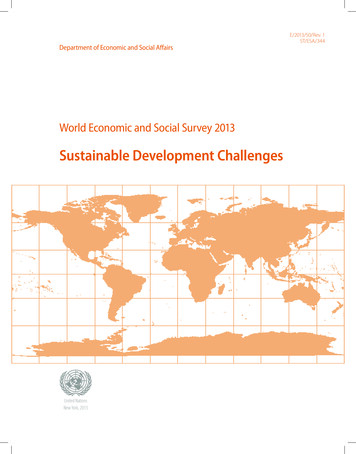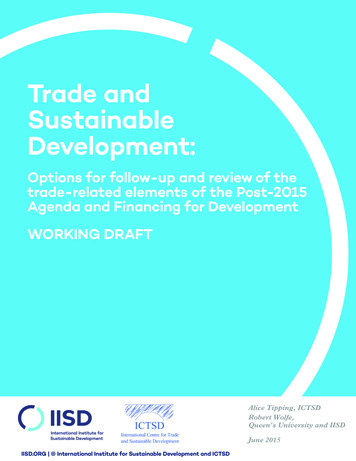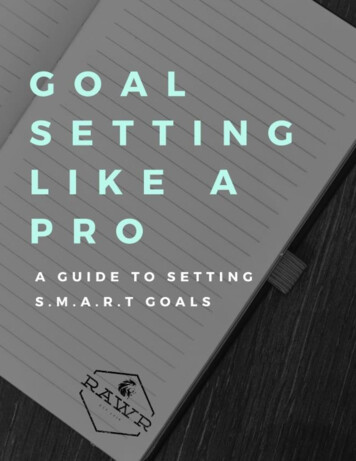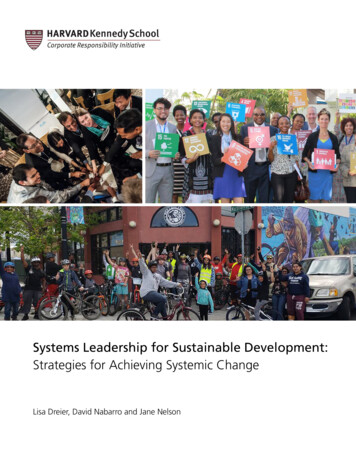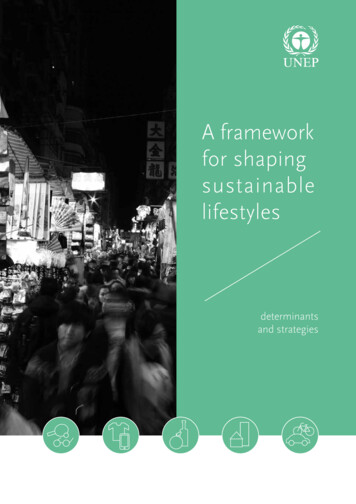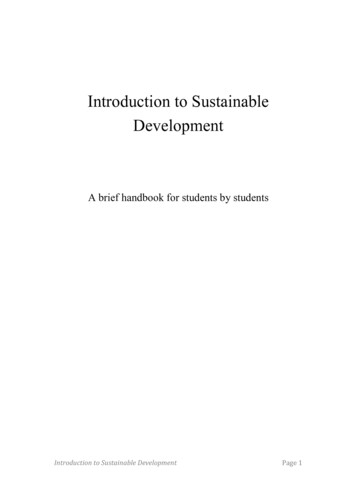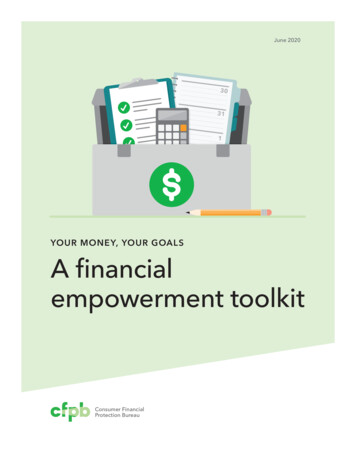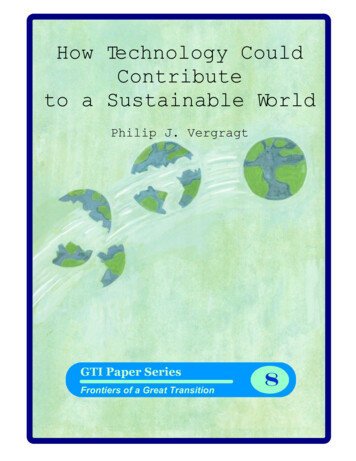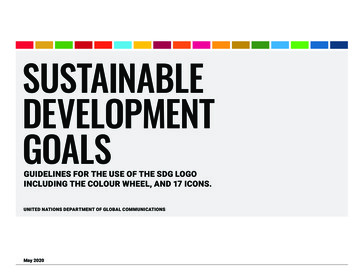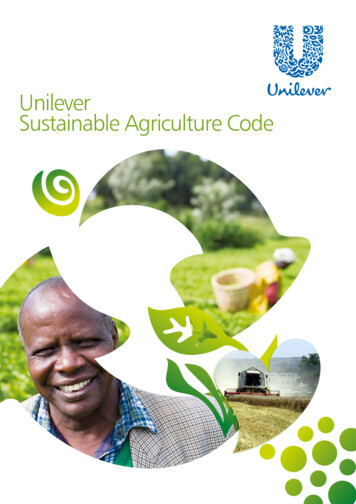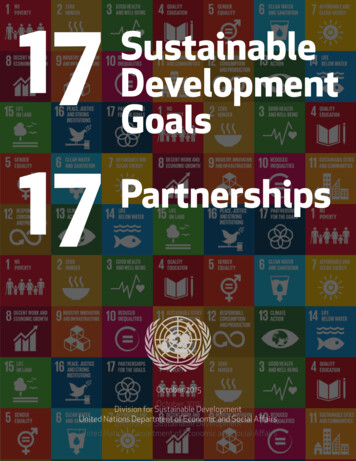
Transcription
1717SustainableDevelopmentGoalsPartnershipsOctober 2015October 2015Division for Sustainable DevelopmentUnited Nations Department of Economic and Social AffairsDivision for Sustainable DevelopmentUnited Nations Department of Economic and Social Affairs
PARTNERSHIPS FORsustainabledevelopment.un.org/partnershipsThe United Nations Sustainable Development Summit for the adoption of the Agenda 2030 and thesustainable development goals was held during three historic days in New York, 25-27 September2015.In the lead-up to the Summit, the UN Secretariat,through its Division for Sustainable Developmentof the Department of Economic and Social Affairs(DESA-DSD), launched Partnerships for SDGs –an online platform to spur partnerships engagement in support of the sustainable developmentgoals.Born out of the Rio 20 Conference through paragraph 283 of the Future We Want outcome document, the platform has been revitalized in preparation for the Agenda 2030, with the 17 sustainable development goals at its core.To date, the platform contains nearly 1,800 partnerships and initiatives promoting sustainable development. Beginning in early September 2015 and through the Summit, over 40 initiatives aiming tosupport the newly adopted sustainable development goals were registered.This compilation provides a summary of 17 initiatives – one for each of the goals. The full list withfurther details is available at: /unsummit2015REGISTER PARTNERSHIPS AND INITIATIVES IN SUPPORT OF THESUSTAINABLE DEVELOPMENT GOALS AT:SUSTAINABLEDEVELOPMENT.UN.ORG/PARTNERSHIPS
GOAL 1End poverty in all its forms everywhereNicaraguan Network of Community Commerce - Red Nicaragüense de Comercio Comunitario (RENICC)The Nicaraguan Network of Community Commerce (RENICC)is a national network composed of 62 organizations that include cooperatives, networks of rural women and female entrepreneurs, consumer networks, and non-governmental organizations (NGOs) dedicated to agriculture and crafts activities.RENICC works to create political and economic lobbying opportunities to encourage the adoption of laws and alternativecommercialization channels into public policy. The network alsocoordinates efforts in 18 farmers’ markets where more than 500women currently sell their products directly to the public. Themain areas of work for RENICC are social economy, food security, rural women’s access to land, free trade agreements, and theefficacy of development cooperation.Partners: Cooperatives, non-governmental organizations (NGOs), rural women networks, female en-trepreneur networksGOAL 2End hunger, achieve food security and improved nutrition and promotesustainable agricultureLocal, Year-round Sustainable AgricultureLocal, Year-round Sustainable Agriculture is a start-up initiativedealing with proven technological advancements in sustainableagriculture for adoption into local communities worldwide. It focuses on renewable, low energy input / high output systems thatare resilient to the effects of severe weather, pests, grid failure,and nuclear fallout. The initiative will result in local food safetyand security, water quality improvement and conservation, zerotoxic waste output, and high quality, nutrient-dense fresh fruitsand vegetables. This initiative also proposes to provide, education on symbiotic relationships, research opportunities, employment, and education on the importance of biodiversity, ecology,sustainability, and connection to the earth.Partners: Yhcrana Organics, CY-OP, Inc., Wye Marsh Wildlife Centre, We Are The Villagers
GOAL 3Ensure healthy lives and promote well-being for all at all agesCreating and nurturing vibrant partnerships to achieve the sustainable developmentgoals in tribal regions of Western IndiaThe Voluntary Association of Agriculture, General Development,Health and Reconstruction Alliance (VAAGDHARA) will createand nurture vibrant partnerships with community institutionsworking on behalf of the poor in tribal regions of western India,with the aim of inculcating appropriate scientific and indigenoustechnology and knowledge to achieve sustainable livelihoodsand realization of true childhood for their children.In order to achieve the sustainable development goals by 2030,VAAGDHARA has a strategy to promote and nurture vibrant institutions working on behalf of the poor such as self-help groups(SHG), SHG federations, farmer producer organizations, etc.,who will be sensitive towards child development and can alsowork on livelihood, education, health, and nutrition. These institutions will be the key for the sustainability of interventions. VAAGDHARA will play the role of a catalyst and facilitator for institutions andnetworks of communities in remote and resource fragile regions so they start their journey towardssustainable development.Partners: VAAGDHARA, community-based organizations, federationsGOAL 4Ensure inclusive and equitable quality education and promote lifelonglearning opportunities for allGlobal Education First Initiative (GEFI)Despite the urgent need for investments in education and theirclear returns, progress on education has stalled in recent years.The cost of leaving millions of children and young people onthe margins of society is far greater than the funds required tojump-start efforts to reach international goals for education,which had shown considerable promise. The Education First initiative aims to accelerate progress towards the Education forAll goals and the education-related Millennium DevelopmentGoals by: 1) Rallying together a broad spectrum of actors forthe final push to 2015; 2) Putting quality, relevant and transformative education at the heart of the social, political and development agendas; and 3) Generating additional and sufficientfunding for education through sustained global advocacy efforts global movement for education - by2015 and beyond.Partners: Partners include UNDP, UNFPA, UNICEF, UN Women, UN Special Envoy for Global Educa-tion, World Bank, Global Partnership for Education, Educate A Child, Education International, GlobalCampaign for Education as well as philanthropic and business institutions.
GOAL 5Achieve gender equality and empower all women and girlsGIRLS! ProjectThe GIRLS! Project utilizes a public health approach to earlygrade literacy as a tool to reduce the social determinants ofhealth such as poverty, education and health inequities, andgender discrimination. GIRLS! Project provides new books thatmeet common core standards to girls in targeted age rangesfrom birth to third grade/class three.The GIRLS! Project approach improves core foundational skillsin the four areas of the English language (reading, writing, listening, and speaking), Braille books and materials are providedfor visually impaired girls. Guided reading workshops and “15Minutes Read Aloud Moments” are conducted to improve comprehension and oral reading fluency(ORF) in third grade/class three. Group reading instruction provides differentiated teaching that supports early grade reading proficiency. The GIRLS! Project approach promotes differentiated instructionto allow girls to focus on their specific needs and accelerate their progress.Partners: Schools Without Borders, Inc.GOAL 6Ensure availability and sustainable management of water and sanitation for allMediterranean Water Knowledge PlatformThe establishment of a Mediterranean Water Knowledge Platform is a prerequisite to the development of sustainable policies for integrated water resources management and climatechange adaptation. The platform aims to provide a commonbasis for the development of national water information systems in four pilot countries, and to deliver an assessment ofwater resources management and use (i.e., drafting of a whitepaper) by collecting and exploiting data of these systems. It willallow for an evaluation of best practices, joint management oftransboundary resources, and follow-up on regional or sub-regional projects and policies in the Mediterranean region, all ona voluntary basis.Partners: International Office for Water, Institut Méditerranéende l’Eau, Euro-Mediterranean Water Information System (EMWIS), Mediterranean Network of Basin Organisations, UnitedNations Environmental Programme Mediterranean Action Plan(UNEP-MAP), Arab League Center for Water, Ministry of Water and Irrigation (Jordan), Ministry of Energy and Water (Lebanon), Ministry of Energy, Mines, Water and Environment (Morocco), Ministry ofAgriculture and water resources (Tunisia)
GOAL 7Ensure access to affordable, reliable, sustainable and modern energy for allSolar Empowered SchoolsSolar Empowered Schools is an initiative that uses sustainableenergy to improve academic performance in primary and secondary rural schools in Africa by providing students who lackaccess to electricity with solar lanterns so that they can extendtheir study time.Solar Empowered School (SES) identifies schools located in ruralcommunities around Africa that are hindered by availability ofartificial lighting. SES then distributes solar lanterns to students,and trains them on how to improve their academic performanceand on how to maintain the lanterns given to them. Training onimproving study habits is held in the communities where the lanterns are distributed, and it teacheschildren how to improve their academic performance by reading extra hours in the evening. SES harnesses the “mentor-your-junior” model to facilitate learning from the community’s brightest student toensure the rest are well brought up.Partners: Africa Sustainable Energy Association, Nigeria Alternative energy Consortium, Southern Af-rica Alternative Energy AssociationGOAL 8Promote sustained, inclusive and sustainable economic growth, full andproductive employment and decent work for allBridge Initiative for Youth EmploymentThe Bridge Initiative envisions a world where all youth are activeparticipants of the social and economic development throughrelevant education and decent work. To achieve this, the initiative will focus on Sub-Saharan African countries, starting withthe Democratic Republic of Congo, by conducting researchprojects on the skills, education and opportunity gaps dividingyouth from the job market. Evidence-based interventions willthen be implemented in the form of training and education opportunities, skills development on workplace behaviours andentrepreneurship, and volunteer and internships placementswith partner organizations in order to increase youth employability.Partners: Young African Leaders Initiative, Congo Leadership Initiative, United States Department ofState, SNV (Netherlands Development Organization, DRC), United Nations Volunteers, Clinton GlobalInitiative
GOAL 9Build resilient infrastructure, promote inclusive and sustainable industrializationand foster innovationCIFAL Global Network: Supporting Local Actors to Achieve Sustainable DevelopmentThe United Nations Institute of Training and Research (UNITAR)is the UN training arm for social and economic development,environmental services and multilateral diplomacy. The GlobalNetwork of International Training Centres for Local Actors (CIFAL) are hubs for capacity building and knowledge sharing between government authorities, international organisations, theprivate sector and civil society. UNITAR and its affiliated globalnetwork, CIFAL, organise around 400 training activities yearly,reaching out to some 25,000 beneficiaries.For its local development work, CIFALs use the knowledgemanagement methodology that consists of various processesof self-assessment, distillation and transmission of experiencesand good practices in order to improve the performance of anorganization. It also includes several tools that provide a common language for the evaluation, exchange, and adaptation ofthe experiences shared by participating cities, as well as a roadmap for action and progress. The process aims at optimizing peer learning between local government officials and key stakeholders. Participants share knowledge, experiences, good practice and lessons learned, in order to build a strategicaction plan integrating international conventions into local development programmes.Partners: United Nations Institute of Training and Research (UNITAR), Federation of Industries of theState of Parana (Brazil), Airport Group of the South of Mexico (ASUR), International Peace Foundation(ROK), Kuala Lumpur City Hall Training Institute (Malaysia), Regional Cooperation Office for City Informatization (China), Moray Council (Scotland), Municipality of Plock (Poland), City of Antwerp (Belgium),Municipality of Ouagadougou (Burkina Faso), E-thekwini Municipality (South Africa), DecentralizedGovernment of the Province of Pichincha (Ecuador), Ministry of Interior and Local Authorities (Algeria),Vice presidency of the Republic of El Salvador, Kennesaw State University (USA).GOAL 10Reduce inequality within and among countriesPromoting Social Accountability to Empower Local-level Community for ImprovedService Delivery and Democratic Governance in East AfricaThe goal of this initiative is to strengthen capacities of citizengroups and government to work together in order to enhancequality of public services delivered to citizens. It seeks to givevoice to the needs and concerns of all citizens on the deliveryand quality of public services. Africa Youth Movement (AYM)will facilitate the implementation, guidance and supervisionby a steering committee formed of representatives of citizens,government, and civil society. AYM will be responsible for thecoordination and provision of capacity development, training,
technical guidance and support to partners to ensure effective and efficient implementation of theinitiative.Partners: APRM, IGAD, AU, youth organizations, youth clubs, Civic organizations, youth networks,UNDP, Africa Governance Initiative, Mo Ibrahim Foundation, UN Youth, governments Sector Ministries, Network of Social Accountability Associations, Global partnership for Social Accountability,World Bank, DFID, African youth, universities, research institutes, politicians, elected councilsGOAL 11Make cities and human settlements inclusive, safe, resilient and sustainableUpgrading the Slums in Abuja, NigeriaThe United Nations Human Settlements Programme (UN-Habitat) in Nigeria has stated that about 80 million Nigerians, representing 79 per cent of the population, are living in slums.The growth of informal settlements around the Federal CapitalTerritory (FCT) has largely been as a result of inadequate andnon-affordable housing. The challenge of securing land tenurefor the teeming populace, the high cost of building materials,inaccessible mortgage mechanisms for the poor as well as thehigh rents of urban accommodation has been responsible formany of the city’s suburban slums. This partnership aims to support the development of human settlements around Abuja bytransforming slums and unhealthy environments through collaboration.There is adequate arrangement for transfer of capacity and technology by involving slum dwellersactively in all stages of the project. Initiative for the Support and Promotion of Human Shelter (ISPHS)is also creating a link between slum dwellers and civil authorities as well as relevant stakeholders, forproper engagement.Partners: Initiative for the Support and Promotion of Human Shelter (ISPHS), Federal Ministry of Land,Housing and Urban Development, Shack and Slum Dwellers Association, Nigeria, Gwagwalada Concern Youth Forum, Lugbe Community Development Association, Institute for Housing and Urban Development, Federation of Urban Poor (FEDUP)GOAL 12Ensure sustainable consumption and production patternsThe Sustainability Literacy Test (SULITEST)The sustainability literacy test (SULITEST) is an online multiple choice question assessment that evaluates, in 30 minutes, the minimum level of knowledge in economic, social and environmental responsibility, applicable all over the world, in any kind of higher education institution (HEI), in any country, forstudents from any kind of tertiary-level course (bachelors, masters, MBAs, PhD).All of the questions in this assessment will ensure that future graduates have basic knowledge on sus-
tainable development and both individual and organisationalsustainability and responsibility. For this purpose, the scope ofthis assessment covers 2 types of question:1)Questions on challenges facing society and the planeti.e. general knowledge on social, environmental and economicissues, basic understanding of the earth e.g. water and carboncycles, greenhouse effect, etc.2)Questions on an organisation’s responsibility in generaland on corporate responsibility in particular i.e. questions onpractices for integrating social responsibility throughout an organisation, and questions on the responsibility of individuals as employees and citizens.Partners: Senior Advisors: UNESCO, UNDP, UNEP, UN DESA, UN PRME, ULSF, CEEMAN, MEDIES,GRLI, ARIUSA, AMFORHT, HEASC, WFCP, GUPES, IDDRI, IAU, Copernicus alliance; Regional-National Expert Committee: RAUSA, ACTS, PRME Chapter Brazil, CGUN, Red Campus Sustentable, RCFA,REDIES, RAUDO, PRME national Chapter for Middle East and North Africa, CGE, CPU, REFEDD, CIRSES, HKSCC, APSCC, CAS-Net JAPAN, CRUI,INAECU, PRME national Chapter UK & Ireland, EAUC,AASHE, DANS; Partners Council: ONET, LVMH, CGE, Kedge, University of Paris Seine, Grenoble Ecolede Management, EAUC, PRME national Chapter UK & Ireland, University of Gothenburg, Des Enjeuxet des HommesGOAL 13Take urgent action to combat climate change and its impacts*Paris Pact on Water and Adaptation to Climate Change in the Basins of Rivers, Lakes,and AquifersThe purpose of this “Paris Pact” is to provide recommendationsof actions that should be undertaken without delay at the mostrelevant scale for water management adaptation to climatechange – i.e., the basins of lakes, rivers, and aquifers. The Pactalso calls for actions of basin organizations and other relevantinstitutions (e.g., governments, international organizations, donors, local authorities, civil society and companies). Such actionswill contribute to reach target 6.4 to 6.b of the SDGs.The “Paris Pact” synthesizes the already existing solid knowledge base on adaptation for climate change in basins, and inparticular: A platform of experience sharing between pilot projects on climate change adaptation in transboundary basins A book collecting examples of experiences and good practices for climate change adaptationin transboundary basins (both developed by the International Office for Water and its partners - UNECE among others).Partners: International Network of Basin Organizations (INBO) with the support of its regional com-
ponents (ANBO, LANBO, CEENBO, MENBO, EURO-INBO, NANBO, EECCA-NBO, and other corepartners, including UNECE, the World Bank and UNESCO.GOAL 14Conserve and sustainably use the oceans, seas and marine resources forsustainable developmentOur Oceans ChallengeThe Our Oceans Challenge (OOC) partner network consistsof influential companies committed to generating innovativebusiness models that promote clean and healthy oceans, notonly by providing financial support but by sharing expertise andknow-how with entrepreneurs and start-ups.OOCC provides an online co-creation platform for entrepreneurs, offshore experts, scientists and those who care for theoceans to share and enrich ideas for a clean and healthy ocean.After a selection made by our partners, OOC provides themeans to realize these ideas by connecting entrepreneurs andstart-ups with corporations their financial resources and expertise, thus shortening the time to market of ocean ventures while tackling some of our most pressingenvironmental and social challenges.Partners: Heerema Marine Contractors, Energy research Centre of the Netherlands (ECN), KPMG, Out-side, Inc., Willteco, Innovation Factory, NIBC Direct, VU University Amsterdam, World Ocean Council,Jules DockGOAL 15Protect, restore and promote sustainable use of terrestrial ecosystems,sustainably manage forests, combat desertification, and halt and reverse landdegradation and halt biodiversity lossIbis Rice InitiativeIbis Rice was launched in 2009 to promote and market wildlife-friendly rice grown in the communities located in areas protected for their biodiversity value in Cambodia. Its work linkswildlife conservation to improving livelihoods of villagers whoseopportunities are limited by the constraints of living in a remotearea with little opportunity to expand their farms and limitedmarket access. Ibis Rice buys paddy at a premium from villagemarketing networks, whose members are made up of farmerswho are often not food secure and rely on forest resources forincome. Ibis Rice has worked to market wildlife-friendly producethat is produced by local communities in the Northern Plains.
Target buyers include domestic tourist hotels and restaurants, food retailers and potentially, international markets.Partners: Wildlife Conservation Society (WCS), Sansom Mlup Prey , Accounting for International Devel-opment (AfID) , Wildlife Friendly Enterprise NetworkGOAL 16Promote peaceful and inclusive societies for sustainable development,provide access to justice for all and build effective, accountable and inclusiveinstitutions at all levelsNational Coordination on the Implementation of SDGs (NACOS INITIATIVE)The NACOS initiative seeks to ensure that there is a coherent,coordinated, and all-inclusive participatory approach to the effective localization, implementation, and coordination of theAgenda 2030. It is through such initiatives that the agenda willbe effectively realized.The first stage of the initiative has been the setting of the stagefor implementation by the “Beyond 2015 Campaign”, which hasfor three years built momentum for implementation by engaging all relevant stakeholders, especially those most affected bypoverty in awareness building and participation. In Zimbabwethis step has been concluded through the successful establishment of the Beyond 2015 Zimbabwe National Hub, the building of public-private partnerships, andthe launching of the NATIONAL COORDINATION OF THE IMPLEMENTATION OF SDGs (NACOS).The final step of the first phase has been the formation of partnership frameworks leading to the development of a concept paper and a full project proposal with a comprehensive implementation and action plan. This last step has been carried out but the process of scoping and creating new partnershipsis an ongoing process that will take place throughout the life of the project. This step will be concludedby a launch meeting for continued work for the implementation period of 2016 – 2030 after the 70thsession of the United Nations’ General Assembly.Partners: Save Matabeleland Coalition, Beyond 2015 Zimbabwe, Regional Centre for Social Responsi-bility (RCSR), Footnote Consultancy, Stop to Start International, Habakkuk TrustGOAL 17Strengthen the means of implementation and revitalize the globalpartnership for sustainable developmentGlobal Partnership for Sustainable DataThe Global Partnership for Sustainable Data is global network of governments, NGOs and businessesworking together to strengthen the inclusivity, trust and innovation in the way that data is used to address the world’s sustainable development efforts. It works to bring the resources of national govern-
ments, independent non-profits, and private companies to bearon the world’s development data poverty.Official statistical systems are the building block for understanding poverty and how to address it. The global partnership seeksto map data gaps at a national level, the channel funding tostrengthen those systems. Thus, the partnership aims to bringthe best data, analytical skills and ideas to solve data problems- from using satellites capture to monitor agriculture efforts, tocitizen engagement tools to understand sanitation requirementsin villages in remote parts of the world. It works to ensure thatgovernments are given the tools they need to ensure they leaveno-one behind in these development efforts.Partners: Global network of governments, NGOs and business-es working together
Register partnerships and initiatives in support of theSustainable Development Goals ipsDivision for Sustainable DevelopmentUnited Nations Department of Economic and Social AffairsContact: inabledevelopment.un.org/partnerships
tion for the Agenda 2030, with the 17 sustainable development goals at its core. To date, the platform contains nearly 1,800 partnerships and initiatives promoting sustainable devel-opment. Beginning in early September 2015 and through the Summit, over 40 initiatives aiming to support the new
